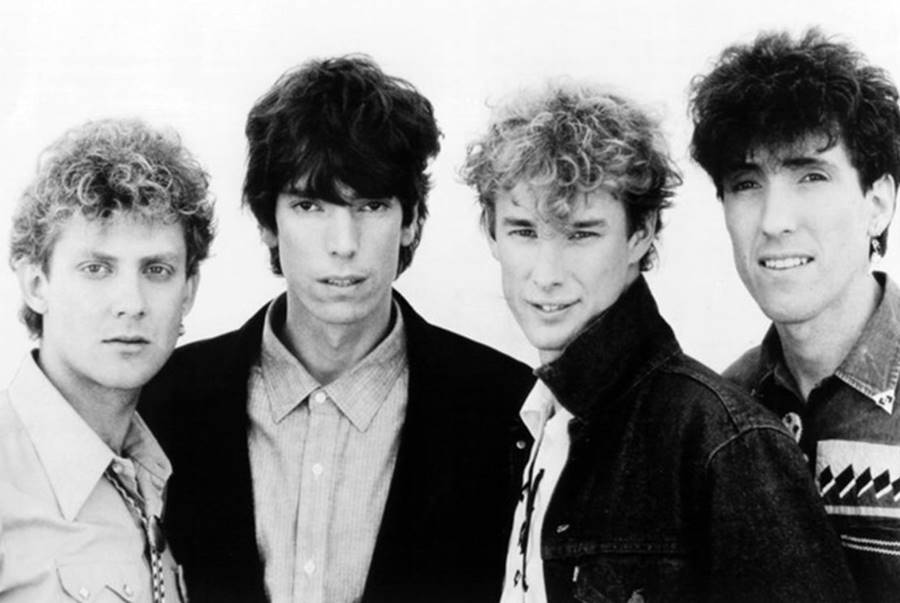
By Jae-Ha Kim
Chicago Sun-Times
April 17, 1987
Back in 1982 when Chip and Tony Kinman were having critical success with their band Rank and File, the group was one of the forerunners in the return to rock’s country roots. They advertised themselves as being good ol’ boys from Austin, Texas, and Chip even spoke with a slight drawl.
It’s five years and zero commercial hit singles later. Although the band won much critical acclaim for its country-influenced debut album “Sundown,” its second album “Long Gone Dead” died on the airwaves. They got dropped from Slash Records and shopped around for more than a year before Rhino Records signed them.
“Our latest record is self-titled because we feel it’s our first album in a lot of ways,” said Chip Kinman, vocalist and guitarist. “Besides, not many people bought our first two albums, so no one will even know this isn’t our debut.”
Rank and File has changed musical direction since the days when the Kinman brothers sang covers of Johnny Cash and Lefty Frizzell. The Kinmans, who in the 1970s fronted a punk band called the Dils, have revamped not only the band’s sound, but also its look. Rank and File will be sporting leather and long hair instead of string ties and plaid shirts when it plays at 7:30 p.m. tomorrow night at Cabaret Metro, 3730 N. Clark. (Tickets are $10; call Ticketmaster at 559-1212).
“A lot of people will say we’ve sold out, but we know that’s not true,” said Tony Kinman, vocalist and bassist. “When we went from the Dils to Rank and File, people accused us of the same thing. We’ve always done the kind of music we were interested in doing, even when we knew it would be commercial suicide. I mean, we could’ve recorded pop pap when we started out, put on some new wave clothes, and probably have done well for ourselves. But we were into roots music, as they call it.”
“That’s what we wanted to record,” Chip added, “and the critics embraced us. By the second album, though, there were other bands doing similar things and we weren’t critics’ darlings anymore. We didn’t want to be doing the same thing for the rest of our lives. So we moved on.”
Moved on they have. “Rank and File,” which also includes Robert Kahr and Jeff Ross, still has a few remnants from its roots period, but its predominantly straightforward rock sound is garnering newfound media interest. The band recently appeared on “American Bandstand,” Tony lip-synching the infectiously bouncy “Black Book” while crowds of well-tanned, toothy California teens bopped before them.
Chip said the best thing about the “Rank and File” album is that it’s the first to capture the sound of the band’s live sets. Though the songs aren’t as subtle as their earlier works, the Kinmans’ beautiful harmonies haven’t changed since they sang about making “chicken in a microwave range.”
Back in ’83, Chip vehemently dismissed bands such as Duran Duran and Culture Club as “soulless bands who write about nonsense. U2 is better than most of the bands in the `new breed,’ but I don’t particularly get into them either. I like bands like the Blasters and Merle Haggard.” Now he’s into Aerosmith and Samantha Fox.
“Hey, you change,” he said, laughing. “We had an eclectic musical background, depending on where we were living.”
Their father was a Marine and the Kinmans grew accustomed to moving every few years. During their years in South Carolina, the brothers were weaned on country music. “It was everywhere and we loved it,” Tony said. By the time they were in their teens, their family had moved to Carlsbad, Calif., a 90 miles south of Los Angeles. They started listening to the Ramones, the New York Dolls and Velvet Underground.
“In a way, I got into music because Southern California is like one big, boring desert,” Chip said. “I had nothing to do and didn’t want to go to college, so I got involved in bands.” Tony studied at the University of California at Berkeley before succumbing to his brother’s wishes that he join one of his bands. After the Dils broke up and Rank and File was born, they moved to Austin to make a name for themselves as country-influenced artists.
“We had a rough time of it for awhile because a lot of the country clubs wouldn’t book us ’cause they said we were too rock, and the rock clubs wanted new wave bands,” Chip recalled. “But when we did get booked, word of mouth spread that we could really entertain. Tony was compared to Johnny (Cash) a lot.
“But there were a few people who just couldn’t accept the fact that a group of young guys with short hair could play country. We learned how to move quickly.”